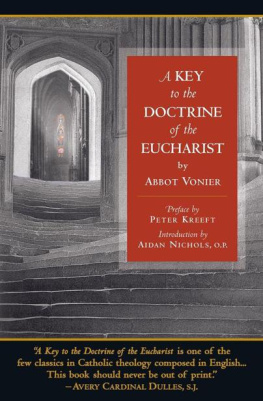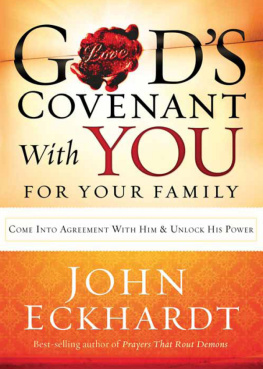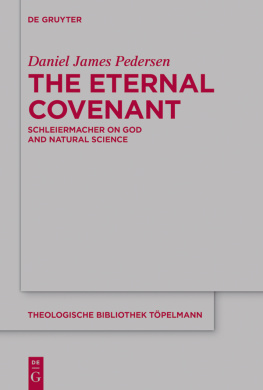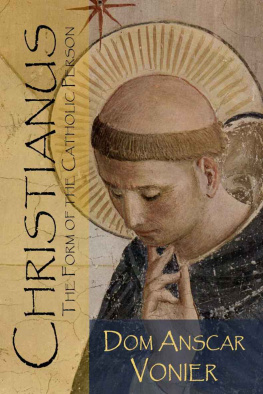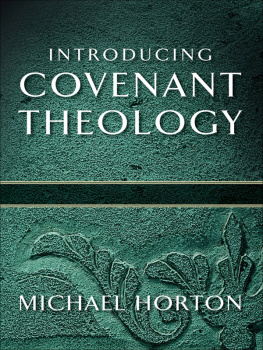THE NEW AND ETERNAL COVENANT
BY
DOM ANSCAR VONIER, O.S.B.
ABBOT OF BUCKFAST
Assumption Press
2013
Nihil Obstat.
Eduardus Mahoney, S.T.D., Censor Deputatus .
Imprimatur.
Edm. Canon Surmont, Vicarius Generalis
Westminster
April 19, 1930.
The Nihil Obstat and Imprimatur are official declarations that a book or pamphlet is free of doctrinal or moral error. No implication is contained therein that those who have granted the Nihil Obstat and the Imprimatur agree with the content, opinions or statements expressed.
This book was originally published in 1930 by Benziger Brothers. The publication is based on that first edition, with some minor corrections and formatting changes, and additional translations of Latin passages.
Copyright 2013 Assumption Press.
Cover image: Das Abendmahl (The Last Supper), from the Speyer Altarpiece, by Master of the Housebook, c. 1480
Foreword
Though a book ought to declare its own purpose through that lucidity one expects from any author, it may still be permissible for the writer to say a word as to the nature of his venture to the reader before the latter opens its pages.
For a long time it has seemed to me that many minds may be helped by an exposition of Catholicism which is practically autonomous, in the sense that it is not an exposition of the faith obtained by contrasting it with error, but is a simple consideration of its essentials. Moreover there is in Catholicism an element of transcendence which is very much neglected today, as most of our spiritual literature concerns itself with individual manifestations of religious or mystical life. It has been my intention to give this transcendent element of Catholicism its due place. There is a growing literature, perhaps more outside the Church than within it, concerning the respective importance in Christianity of the elements which are called God-ward and man-ward; in fact there is a definite movement afoot which denies such values in Atonement mystery as have reference to the offended rights of God. This book is written to emphasize the God-ward side of Catholicism and as a consequence to enhance the institutional aspects of our holy faith.
I am conscious that I have undertaken an unpopular task in these days of crypto-modernism. Yet that peace of mind which comes from believing cannot be ours unless we accept resolutely the vast dogmatic truths whose power and whose life are independent of the transient moods and phases of the human mind. I wish to see in the Church that sense of triumph and security, that feeling of spiritual superiority which is essential to Catholicism and without which it must lack the power to satisfy the human heart.
ANSCAR VONIER, O.S.B. Abbot.
Buckfast
Purification, 1930
I
The Speech of the Faith
It is an uncontested fact that the Catholic Church has been witnessing during the last four centuries enormous losses and heavy apostasies. The Protestantism of the sixteenth century was a terrible landslide, and we are beholding with our own eyes a disappearance of belief to a degree which would have appeared incredible the staunch churchmen of the ages of faith. It has seemed to me that this instability in the external fortunes of the Church has made us timid, has rendered us nervous, and has deprived us, at least to a certain extent, of that sense of spiritual victory which should never be absent from the true Catholic mentality. The forces of disruption which have separated whole races and peoples from the Church seem to have filled us, who have remained faithful through the grace of God, with a sense of terror.
If have often wondered how a Catholic would feel concerning his faith if there had never been any schisms, heresies or apostasies, if the tribulations which have been sent to the Church had been only persecutions from without, from the pagan. Such exterior trials could never dim the vision of the Churchs glory because they are the acts of her official enemy: the things that fill the soul with the dark feelings of panic are the losses to the Church in those who have been baptized with her Baptism; such losses, not the external persecutions of the heathen, are calculated to diminish the joy of our faith and to obscure that certainty of victory which is in Christ. It is in this sense that I should like to know what would be the feelings of a Catholic if the Church had always been supreme mistress over all baptized souls, if she had never suffered from heresies or schism, if all her sons had carried out the precept of St. Paul: That with one mind and with one mouth you may glorify God and -the Father of our Lord Jesus Christ (Rom 15:6).
Though we may give a certain amount of credence to a saying which is often repeated, perhaps too often, that schisms and heresies and apostasies purify the Church by trying her, there is one evil which those sad events undoubtedly leave behind them, a feeling of restlessness in many devout believers. Moreover, as every theologian will admit, through the struggles with heresy Catholic doctrine loses something of its harmonious propositions, as we have to insist on one truth almost to the exclusion of others in our defensive work. Heresies are generally the denial of one specific doctrine, and the Catholic doctor in defense of the endangered dogma has almost to neglect everything else in order to give his full attention to the position that is in peril. A good deal of Catholic theology, though always most orthodox, is not always seen in its due proportions, just as in war the hasty and irregular trenches that are thrown up to shelter the bodies of the men who defend their country are, for the time being, of greater importance than ancient cities far back in the rear.
To be able to state Catholicism today as it would have been stated by a theologian of genius on my supposition of there having been no contradictions in the city of God, could not of course be any mans pretension, however deeply we might sigh for such an ideal exposition. At the same time one task certainly ought not to be above our capacity that of enumerating the permanent, the unalterable, the everlasting elements of Catholicism, and the glories of our inheritance; glories which no human wickedness, no instability of human mind, no historic happenings could ever dim.
I say at once that the Churchs behavior in her official position has never known any other difference than a change of emphasis, i.e., that at one time under the pressure of detractors and gainsayers she laid stress on the worth of one of her treasures more than of another, because that worth had been called in question. The official expression of Catholicism has remained uniform to an astonishing degree. But the ideal thing which I have before my mind is a state of perfection in the Catholic people itself. I dream of Catholic nations, of Catholics in their millions, entering with intelligence, with full appreciation, into the glories of their faith and giving practical preference to those elements of our divine faith which are its very essence and constitution. I dream of a Catholicism which I would willingly call classical, in the sense in which the word classical is used in all aesthetical literature. It means a clear apprehension, and that not only by a few but by the many, of essential things as essential, however high and lofty they may be. I would, for instance for the sake of clarity I already anticipate describe a clear apprehension of the gift of the Holy Ghost as a classical attitude in Catholics. The Church herself, particularly in her Liturgy, has remained eminently classical; the masses of her people possess spiritual education in the things of Christ in degrees which are immensely varying: fundamentally all Catholics possess the faith, but the extent of their knowledge of the things of the faith, the way in which the doctrines of the faith affect their intellects, their imaginations, in fact, all their powers, is, of course, not one but many; it is high or low, is vast or small, according to individuals and even according to historic periods.
Next page

